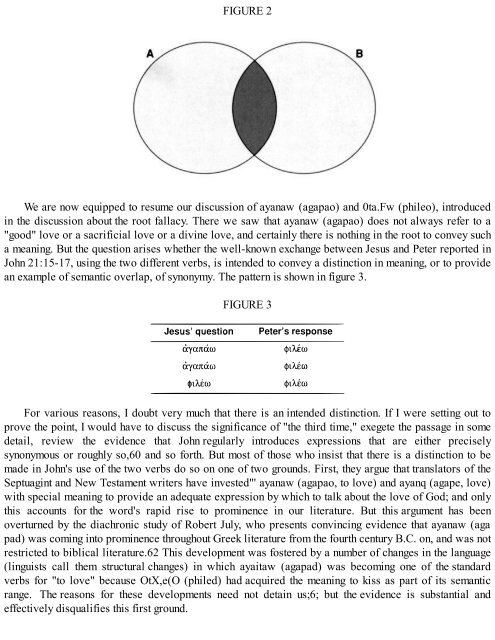Exegetical Fallacies - D. A. Carson
Exegetical Fallacies - D. A. Carson
Exegetical Fallacies - D. A. Carson
Create successful ePaper yourself
Turn your PDF publications into a flip-book with our unique Google optimized e-Paper software.
FIGURE 2<br />
We are now equipped to resume our discussion of ayanaw (agapao) and 0ta.Fw (phileo), introduced<br />
in the discussion about the root fallacy. There we saw that ayanaw (agapao) does not always refer to a<br />
"good" love or a sacrificial love or a divine love, and certainly there is nothing in the root to convey such<br />
a meaning. But the question arises whether the well-known exchange between Jesus and Peter reported in<br />
John 21:15-17, using the two different verbs, is intended to convey a distinction in meaning, or to provide<br />
an example of semantic overlap, of synonymy. The pattern is shown in figure 3.<br />
FIGURE 3<br />
For various reasons, I doubt very much that there is an intended distinction. If I were setting out to<br />
prove the point, I would have to discuss the significance of "the third time," exegete the passage in some<br />
detail, review the evidence that John regularly introduces expressions that are either precisely<br />
synonymous or roughly so,60 and so forth. But most of those who insist that there is a distinction to be<br />
made in John's use of the two verbs do so on one of two grounds. First, they argue that translators of the<br />
Septuagint and New Testament writers have invested"' ayanaw (agapao, to love) and ayanq (agape, love)<br />
with special meaning to provide an adequate expression by which to talk about the love of God; and only<br />
this accounts for the word's rapid rise to prominence in our literature. But this argument has been<br />
overturned by the diachronic study of Robert July, who presents convincing evidence that ayanaw (aga<br />
pad) was coming into prominence throughout Greek literature from the fourth century B.C. on, and was not<br />
restricted to biblical literature.62 This development was fostered by a number of changes in the language<br />
(linguists call them structural changes) in which ayaitaw (agapad) was becoming one of the standard<br />
verbs for "to love" because OtX,e(O (philed) had acquired the meaning to kiss as part of its semantic<br />
range. The reasons for these developments need not detain us;6; but the evidence is substantial and<br />
effectively disqualifies this first ground.



